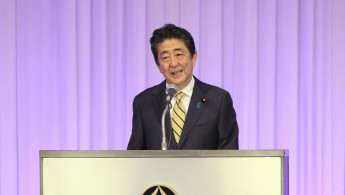Japan premier to make first official visit to Iran since Islamic Revolution
A government official said Tokyo was "still arranging details, including whom our prime minister will meet there" but local media have said Abe will hold talks with Iran's Supreme Leader Ayatollah Ali Khamenei and President Hassan Rouhani.
This would be Japan's first offical visit to Iran in 41 years - Tokyo has not officially stepped foot in Iran since the start of the 1979 Islamic revolution.
As tensions intensify between Iran and Japan's key ally the US, Abe has reportedly proposed serving as a go-between by directly holding talks with Tehran's key leaders.
During his state visit to Tokyo in late May, US President Donald Trump said he remained open to talks with Tehran, appearing to give the green light to Abe's plan.
Abe told a news conference with Trump: "By closely cooperating between Japan and the US, I would like to help ease the current tension surrounding the Iranian situation."
Tokyo and Tehran have maintained a good relationship as resource-poor Japan relies heavily on imports of oil from the Middle East, though crude from Iran accounted for just 5.3 percent of the country's total imports last year.
On the other hand, Iranian and US leaders have ratcheted up barbs and insults ever since Trump was elected as president in 2016.
Living up to his campaign promises, Trump withdrew the US in May 2018 from the landmark 2015 nuclear deal between Iran and major world powers, and reimposed sanctions.
The war of words intensified after Iran's Revolutionary Guards were designated a "terrorist organisation".
Tehran hit back by declaring the US a "state sponsor of terrorism" and Washington's forces in the region "terrorist groups".
Fears the war of words could flare into a military clash escalated when Washington dispatched the USS Abraham Lincoln carrier group, an amphibious assault ship, a Patriot missile battery and B-52 bombers to the region.





 Follow the Middle East's top stories in English at The New Arab on Google News
Follow the Middle East's top stories in English at The New Arab on Google News
![The UAE is widely suspected of arming the RSF militia [Getty]](/sites/default/files/styles/image_330x185/public/2024-11/GettyImages-472529908.jpg?h=69f2b9d0&itok=Yauw3YTG)
![Netanyahu furiously denounced the ICC [Getty]](/sites/default/files/styles/image_330x185/public/2024-11/GettyImages-2169352575.jpg?h=199d8c1f&itok=-vRiruf5)
![Both Hamas and the Palestinian Authority welcomed the ICC arrest warrants [Getty]](/sites/default/files/styles/image_330x185/public/2024-11/GettyImages-2178351173.jpg?h=199d8c1f&itok=TV858iVg)